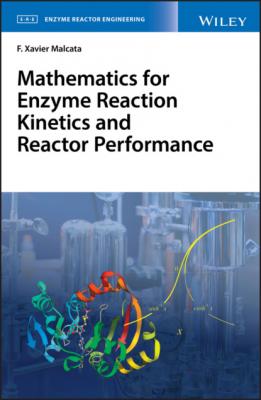Mathematics for Enzyme Reaction Kinetics and Reactor Performance. F. Xavier Malcata
Читать онлайн.| Название | Mathematics for Enzyme Reaction Kinetics and Reactor Performance |
|---|---|
| Автор произведения | F. Xavier Malcata |
| Жанр | Химия |
| Серия | |
| Издательство | Химия |
| Год выпуска | 0 |
| isbn | 9781119490333 |
(2.322)
which reduces to
because cos π/2 is nil and sin π/2 is unity; Eq. (2.323) confirms that sine and cosine are complementary functions – so a change of variable to x ≡ π/2 − θ1 (implying θ1 = π/2 − x) allows retrieval of Eq. (2.294), as expected.
After rewriting Eq. (2.321) as
(2.324)
at the expense of Eqs. (2.295) and (2.296), and changing notation of −y to y (in view of its being a dummy variable), one obtains
Eq. (2.325) permits rapid calculation of the cosine of a sum of two arguments, again based on the sine and cosine of the individual arguments. On the other hand, Eqs. (2.294) and (2.323) allow reformulation of Eq. (2.321) to
(2.326)
where the argument of the left‐hand side may be rearranged to read
since dummy variable π/2 − x may as well be rewritten as just x, Eq. (2.327) transforms to
– thus unfolding an expression for the sine of a sum of two arguments based on sine and cosine of either argument. Finally, one may rewrite Eq. (2.328) as
again with the aid of Eqs. (2.295) and (2.296); since −y may be exchanged with y in both sides for being a dummy variable, Eq. (2.329) eventually yields
– so the difference between the two cross products of sine and cosine of arguments x and y allows generation of sine of the corresponding difference.
In view of the definition of tangent conveyed by Eq. (2.299), one may write
(2.331)
following insertion of Eqs. (2.321) and (2.330); division of both numerator and denominator by cos x and cos y gives rise to
(2.332)
where insertion of Eq. (2.299) allows simplification to
By the same token, ordered division of Eq. (2.328) by Eq. (2.325) generates
(2.334)
where division of both numerator and denominator of the right‐hand side simultaneously by cos x and cos y unfolds
Eq. (2.335) becomes
after taking Eq. (2.299) into account. Equations (2.333) and (2.336) permit calculation of the tangent of an algebraic sum of arguments, knowing the tangents of the individual arguments.
On the other hand, one may take reciprocals of both sides of Eq. (2.333) to get
(2.337)
with division of both numerator and denominator of the right‐hand side by tan x and tan y yielding
